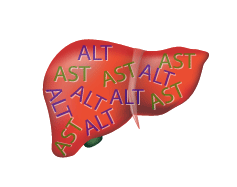
Hepatic impairment is simply any impairment of liver function. “Hepatic” means “of the liver.” Hepatic impairment is of great medical concern because of the vital part the liver plays in digestion, metabolism, and other things. The liver manufactures essential proteins, facilitates the metabolism of fats and carbohydrates (the principle sources of energy), and aids in the digestion of meats, fats, and fat-
Because the liver does so much that is crucial for survival, when its functioning is impaired this is a serious and potentially life-
Causes
Liver function can be impaired by any significant liver disease, as well as by traumatic damage to the organ itself. Some of the more common liver diseases are described below.
Cirrhosis Of The Liver
Cirrhosis is a progressive, very serious liver disease that consists of scarring of liver tissue and the formation of fibrous growths (fibrosis). Over time, the fibrotic tissue replaces more and more of the healthy liver tissue and begins to impair hepatic function. If the disease is allowed to progress to its terminal stage, liver functioning is impaired to the point of being almost nonexistent and the prognosis is fatal unless a liver transplant is successfully performed. Earlier stages of cirrhosis may involve no hepatic impairment at all or a less severe degree of impairment. Cirrhosis may be caused by alcohol abuse (as can other liver diseases). It can also result from obesity, diabetes, hereditary factors, and some other causes.
Cancer Of The Liver
Cancer of the liver is like other cancers in that it involves the abnormal, uncontrolled growth of liver tissue cells to form tumors that consume nutrients needed by the liver and ultimately impair the organ’s functioning. Liver cancer may emerge as a primary cancer in the liver itself or metastasize from another location of the body. As with all cancers, the disease is progressive and seldom goes into remission without treatment.
Hepatitis
Hepatitis refers to a swelling or inflammation of the liver due to any of several causes. One common cause of hepatitis is a viral infection, of which there are several strains producing slightly different diseases. Hepatitis can also be caused by alcohol abuse and by other things that can cause other diseases of the liver, such as obesity or diabetes or viral infections.
Symptoms Of Hepatic Impairment
When the liver functions are significantly impaired, symptoms can include pain in the abdominal area, swelling of the liver itself and nearby tissues, swelling of the legs (edema), rashes and discoloration on the skin, jaundice (a yellowing of the skin and of the whites of the eyes), fatigue, nausea and vomiting, and various levels of pain following meals, exercise, or the drinking of alcohol. At more serious levels of impairment, liver dysfunction can lead to coma, unconsciousness, and death.
When symptoms of hepatic impairment show up, the condition of the liver has progressed to the point where prognosis is not necessarily good, particularly if the liver disease at work is a chronic one like cirrhosis (contrasted to an acute condition such as acute hepatitis, which may produce significant hepatic impairment but only temporarily).
Diagnosis Of Liver Disease
Because liver disease in its early phases is often asymptomatic, early detection depends on diagnostic tests. Most commonly, liver disease is detected by means of a blood test for elevated hepatic enzymes. Follow-
Once liver disease has been diagnosed, the underlying cause is sought. For example, a diagnosis of fatty liver disease or early-
If liver impairment has already begun, the goal is to arrest the disease before it becomes significant and irreversible. If hepatic impairment has progressed to the point that the prognosis is terminal, a liver transplant may be the only way the patient can survive.